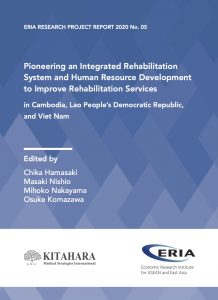RESEARCHERS
Shigemi Kitahara and Chika Hamasaki, Kitahara International Hospital and Kitahara Medical Strategies International Co. Ltd., Japan
Brain injury impairs physical functions and activities of daily living (ADL). It often results in the need for long-term care. Very little research has been done to date in developing economies on the reality of brain injury–caused long-term care. Also, facilities for rehabilitation for brain injury patients are extremely limited in developing economies, so little is known about the current status and the efficacy of rehabilitation for patients with brain injuries.
This study will focus on brain injury rehabilitation in Cambodia, Lao PDR, and Vietnam, where rapid aging is expected in the near future. Societies facing rapid aging are expected to see a greater number of patients with brain injury (e.g., stroke) as compared to societies with younger populations given the accumulation of risk factors as individuals age—i.e., hypertension, diabetes mellitus, and hyperlipidemia—and thus an increase in the demand for long-term care. An increase in the number of older people who require long-term care can impose a very heavy burden on developing economies like these three countries, where it is predicted that aging will take place before the countries are able to achieve sufficient economic development to establish reliable social welfare systems for the elderly. Urgent action is required in these countries to disseminate preventive measures for brain injury and also to prevent the impairment of ADL of patients with brain injuries.
This project will examine whether Japanese-style rehabilitation can contribute to the prevention of impairment of physical function and ADL of patients with brain injuries in these countries. The study examines the efficacy of Japanese-style rehabilitation for patients with brain injury as well as the impact of education and support for the kin who provide long-term care to patients with brain injuries. It also entails an education and training program for rehabilitation therapists in these countries.
This study is expected to contribute to the development of rehabilitation service industries in the three focus countries. Newly emerging rehabilitation service industries will contribute to economic development, as well as to the prevention of impairment of physical function and ADL. It should send a strong message to policymakers about the importance of preventive measures that can reduce the burden of healthcare and long-term care.


